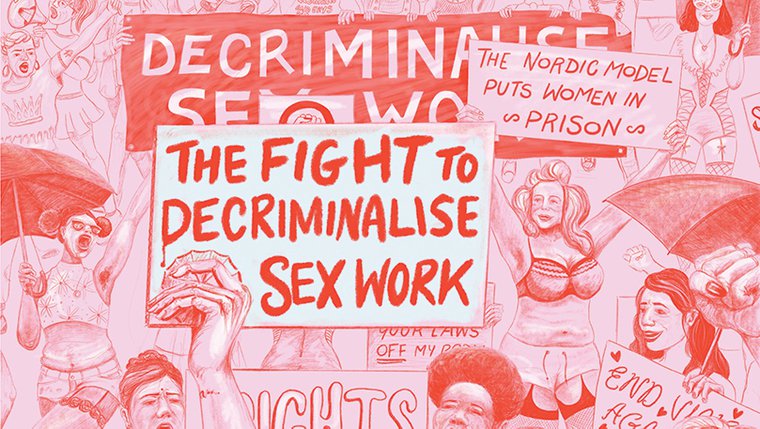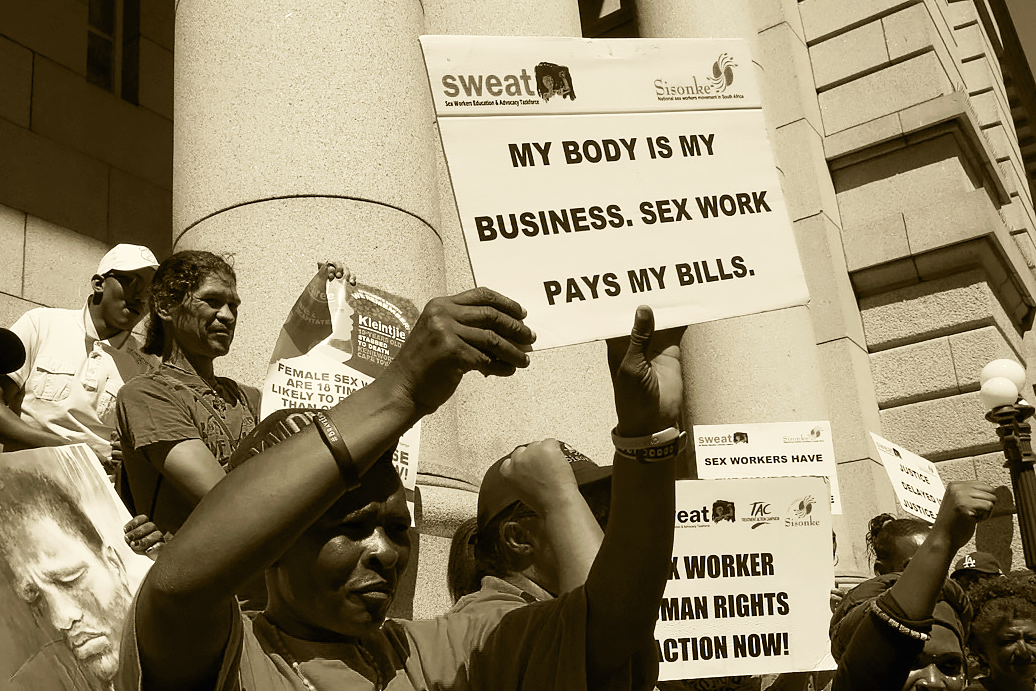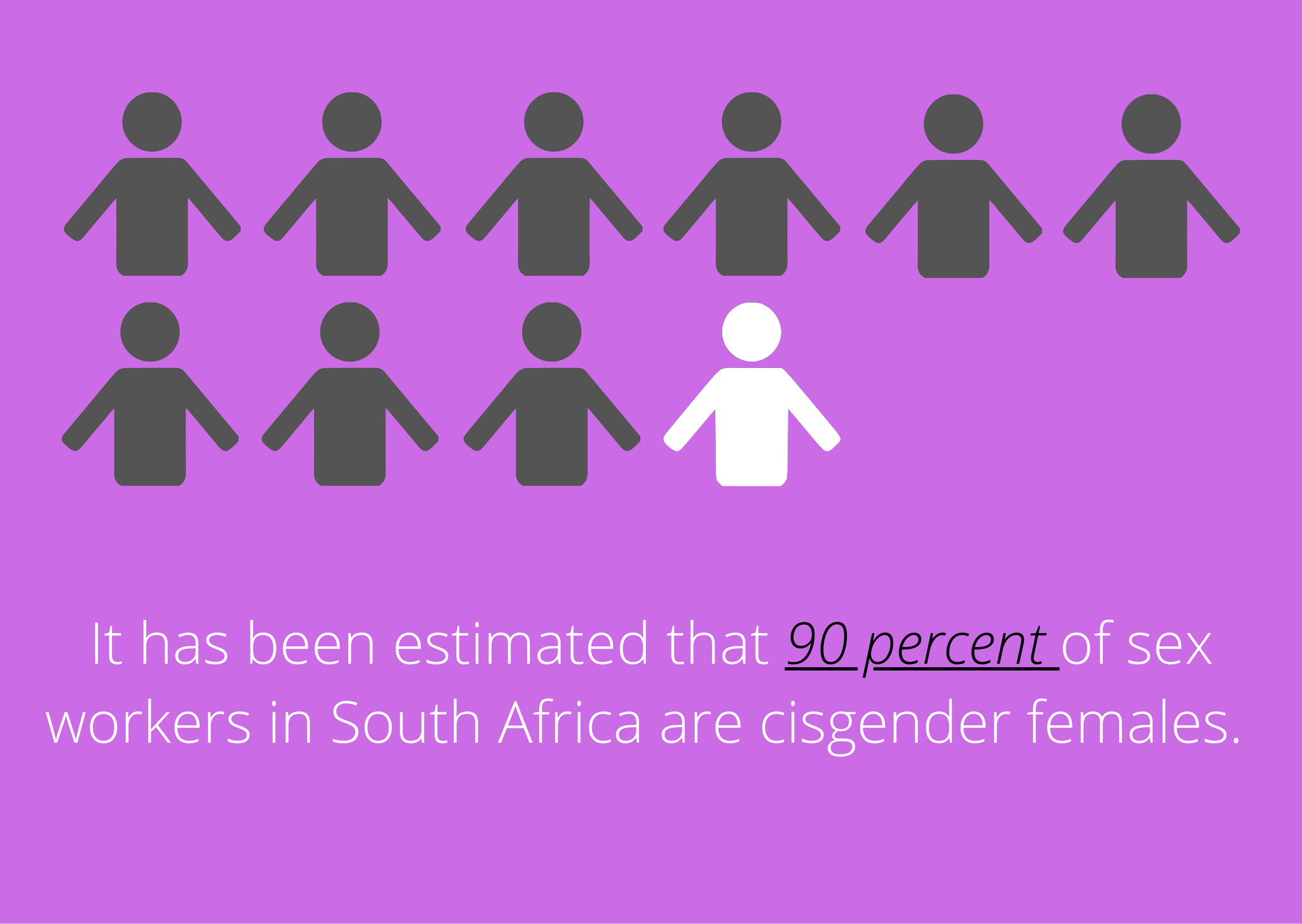Decoding Decriminalisation
By Isabella Liss
Photographs & Infographics by Yaeesh Collins
Despite a constitution that is widely believed to be among the world’s most liberal and comprehensive in terms of human rights, sex work is fully criminalised in South Africa. This means that if a sex worker is mistreated in any way on the job, they themselves will be penalised for reporting the incident, because they have admitted to participating in an illegal profession. Decriminalising sex work solves problems for society’s vulnerable, but can cause further issues if not done thoughtfully. For SA sex workers, it’s more important now than ever.
The Nordic Model
Nico* is a sex worker and activist campaigning for decriminalisation in SA. They began their activism in Canada, noticing that the people around them heavily critiqued a new bill incorporating Nordic sex work legislation. “The Nordic Model” refers to a framework that criminalises “The John” (slang for client), rather than the sex worker. This “partial decriminalisation” can do more harm than good. It often results in the increased surveillance of sex workers, and invasive treatment such as monthly STD testing which they must consent to in order to legally practise. Canadian sex workers pay income tax under the Nordic model, often to a government that does not take their concerns seriously, and is violating their right to privacy. The “John” has power to report a sex worker for not paying income tax, and often uses this as a form of intimidation. Further, criminalising the client results in limited opportunities for income. You cannot have a one-sided business transaction. This contributes to stigmatisation of the profession. Other countries that employ the framework include Sweden, Norway, and Iceland. Activists like Nico hope to spread awareness, and ensure that South African advocates for decriminalisation can learn from other countries’ failures.
*Name has been changed. Nico uses the pronouns they/them/their as they identify as non-binary.

Why was sex work made illegal in the first place?
Many of the issues sex workers face today can be taken back to two pieces of legislation: The Immorality Act and The Criminal Procedures Act. The Immorality Act (renamed “The Sexual Offences Act”) is situated in outdated Apartheid ideology. It aimed to prohibit white citizens from engaging in sexual relations with anyone of colour, and was later extended to prohibit homosexual relations, extramarital sex, and even sex toys. Prohibition of brothel-keeping was originally derived from legislation preventing “indecent acts between whites and anyone non-white”. The intention of these laws was never to protect women — certainly never black women. One must ask why we still adhere to laws that were not formulated to protect the very people that are in need today. Further, The Criminal Procedures Act specifies that police must clearly explain reasons for arrest, yet the norm is for sex workers to experience confusion. For example, SWEAT reports that it is not uncommon for sex workers to be arrested for “loitering”. This is in no way illegal, but “loitering” as a prostitute ensures women are targeted.
How does decriminalisation help solve problems faced by sex workers?
Decriminalising sex work means that workers will be legally recognised as labourers. This entitles them to healthcare for their work, counselling, UIF, the ability to join a union, and relief funding from government in future crises. The worker’s unions in South Africa hold much power, enabling members to voice their concerns and have demands met. Sex work is a physically demanding and sometimes dangerous job. As of 2019, SWEAT and Sonke Gender Justice report that sex workers are regular victims of armed robbery, sexual assault, and specifically rape by police officers. Access to counselling and therapy, and the resources to maintain one’s sexual health, are in the best interests of the public. Unfortunately, South Africa does have a failing healthcare system, and the right to necessary medical care is met for very few.

According to the World Health Organization, government spending on healthcare comprises less than half of total health expenditure, even though the public system serves more than 80% of the population (around 40 million South Africans) without private health insurance. Further, 70% of all doctors and most specialists only work in the private sector, the remaining 30% serving the public sector. The majority of South Africans do not have access to adequate healthcare. As a result, demands for better healthcare focusing on a specific group in society are seen as idealistic.
Much emphasis has been placed on studying sex workers with regards to the HIV epidemic. This is far from the only reason that sex worker’s health should be a priority, and certainly not above the need to protect sex workers as marginalised members of society. But the prevalence of HIV among sex workers highlights a drastic need for intervention. HIV prevalence rates amongst female sex workers is thought to be between 40%-88%, compared to just 14.4% among women in the general population. HIV prevalence is as high as 71.8% among female sex workers in Johannesburg, one of the highest rates in the world.
Failure to meet Current Demands
South African sex workers are particularly vulnerable to police brutality and gender-based violence because there are no repercussions for those that maltreat them. (It has been estimated by SWEAT that 90% of sex workers in South Africa are cisgender females.) The vast majority practise prostitution in order to support multiple dependents, often children and the elderly.
Organizations like SWEAT and Sisonke continue to demand that government address decriminalisation in line with issues of gender-based violence — now referred to as the GBV epidemic. The National Strategic Plan on Gender-based Violence and Femicide published a document in March 2020, calling for a bill to fully decriminalise sex work by 2024. Its success would mean workers cannot be legally penalised in any way for practising. This should not be confused with legalisation, and practice would still be illegal in the constitution. (It is important to understand the distinction between decriminalisation and legalisation. Right now, legalisation comes with concerns of unfair surveillance from the state. It’s a very long-term goal.) Unfortunately, this document has not evoked a response from government. In line with “crisis capitalism”, the lockdown took precedence, and other “minor issues" submitted to authorities this year are unlikely to be addressed any time soon. This is during a time when sex workers are in greater need than ever before.
Pandemic Struggles & Assistance
Nico is currently involved in various initiatives to assist sex workers in need, particularly those affected by COVID-19. Their SWIRL relief fund (Sex Worker Immediate Relief for Lockdown) aims to organise funding and defer rent payment for those who cannot make an income due to the pandemic. Workers make contact through an anonymous Instagram page and request grants. Nico has also been assisting other sex workers in helping move their work online, educating them in purchasing resources or becoming comfortable with payment applications. Due to constraints on movement and physical meetings with clients, performing in front of a webcam is something many sex workers who would ordinarily have penetrative sex turn to. This means they may now need a good camera and smartphone in order to make ends meet. Alternatively, Nico also suggests selling photos via eWallet. Unfortunately, Nico admits this initiative hasn’t been particularly effective. The equipment is expensive, and demands data and internet speed that many don’t have access to. It’s one of the many struggles sex workers will face in adapting to the industry post-lockdown.
Coronavirus has resulted in the dramatic loss of livelihood for South African sex workers. Lack of access to resources has made it impossible to adapt the business model. Due to their criminalised status, sex workers are unable to receive sufficient financial assistance and support. Decriminalisation is the first step in ensuring a better life for sex workers and their dependents. For those who have recently been affected it may be too late, but we have the opportunity to better prepare for future crises. Decriminalisation is therefore an ideal we work towards.


